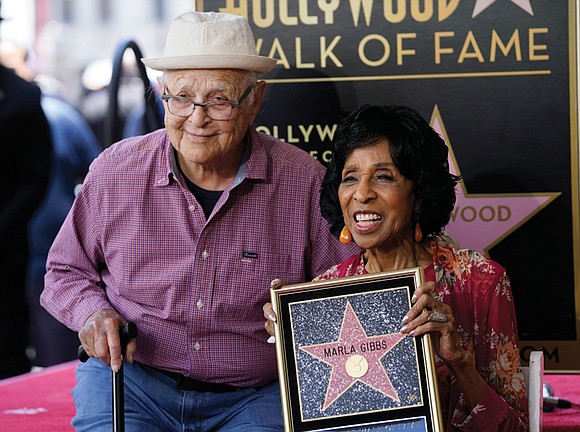Norman Lear, producer of top TV sitcoms, dies at 101
Associated Press | 12/7/2023, 6 p.m.

LOS ANGELES - Norman Lear, the writer, director and producer who revolutionized primetime television with “All in the Family,” “The Jeffersons” and “Maude,” propelling political and social turmoil into the once-insulated world of TV sitcoms, has died. He was 101.
Mr. Lear died Tuesday night in, Dec. 5, 2023, his sleep, surrounded by family at his home in Los Angeles, said Lara Bergthold, a spokesperson for his family.
A liberal activist with an eye for mainstream entertainment, Mr. Lear fashioned bold and controversial comedies that were embraced by viewers who had to watch the evening news to find out what was going on in the world. His shows helped define primetime comedy in the 1970s, launched the careers of Rob Reiner and Valerie Bertinelli and made middle-aged superstars of Carroll O’Connor, Bea Arthur and Redd Foxx.
Mr. Lear “took television away from dopey wives and dumb fathers, from the pimps, hookers, hustlers, private eyes, junkies, cowboys and rustlers that constituted television chaos, and in their place he put the American people,” the late Paddy Chayefsky, a leading writer of television’s early “golden age,” once said.
Tributes poured in after his death:
“I loved Norman Lear with all my heart. He was my second father. Sending my love to Lyn and the whole Lear family,” Mr. Reiner wrote on X, formerly Twitter.
“More than anyone before him, Norman used situation comedy to shine a light on prejudice, intolerance, and inequality. He created families that mirrored ours,” Jimmy Kimmel said.
“All in the Family” was immersed in the headlines of the day, while also drawing upon Mr. Lear’s childhood memories of his tempestuous father. Racism, feminism, and the Vietnam War were flashpoints as blue collar conservative Archie Bunker, played by Mr. O’Connor, clashed with liberal son-in-law Mike Stivic, Mr. Reiner. Jean Stapleton co-starred as Archie’s befuddled but good-hearted wife, Edith, and Sally Struthers played the Bunkers’ daughter, Gloria, who defended her husband in arguments with Archie.
Mr. Lear’s work transformed television at a time when old-fashioned programs as “Here’s Lucy,” “Ironside” and “Gunsmoke” still dominated. CBS, Lear’s primary network, would soon enact its “rural purge” and cancel such standbys as “The Beverly Hillbillies” and “Green Acres.” The groundbreaking sitcom “The Mary Tyler Moore Show,” about a single career woman in Minneapolis, debuted on CBS in Sept. 1970, just months before “All in the Family” started.
But ABC passed on “All in the Family” twice and CBS ran a disclaimer when it finally aired the show: “The program you are about to see is ‘All in the Family.’ It seeks to throw a humorous spotlight on our frailties, prejudices, and concerns. By making them a source of laughter we hope to show, in a mature fashion, just how absurd they are.”
By the end of 1971, “All In the Family” was No. 1 in the ratings and Archie Bunker was a pop culture fixture, with President Richard Nixon among his fans. Some of his putdowns became catchphrases. He called his son-in-law “Meathead” and his wife “Dingbat,” and would snap at anyone who dared occupy his faded orange-yellow wing chair. It was the centerpiece of the Bunkers’ rowhouse in Queens, and eventually went on display in the Smithsonian’s National Museum of American History.
Hits continued for Mr. Lear and then-partner Bud Yorkin, including “Maude” and “The Jeffersons,” both spinoffs from “All in the Family,” with the same winning combination of one-liners and social conflict.
In a 1972 two-part episode of “Maude,” the title character (played by Ms. Arthur) became the first on television to have an abortion, drawing a surge of protests along with high ratings. And when a close friend of Archie’s turned out to be gay, President Nixon privately fumed to White House aides that the show “glorified” same-sex relationships.
“Controversy suggests people are thinking about something. But there’d better be laughing first and foremost or it’s a dog,” Mr. Lear said in a 1994 interview with The Associated Press.






